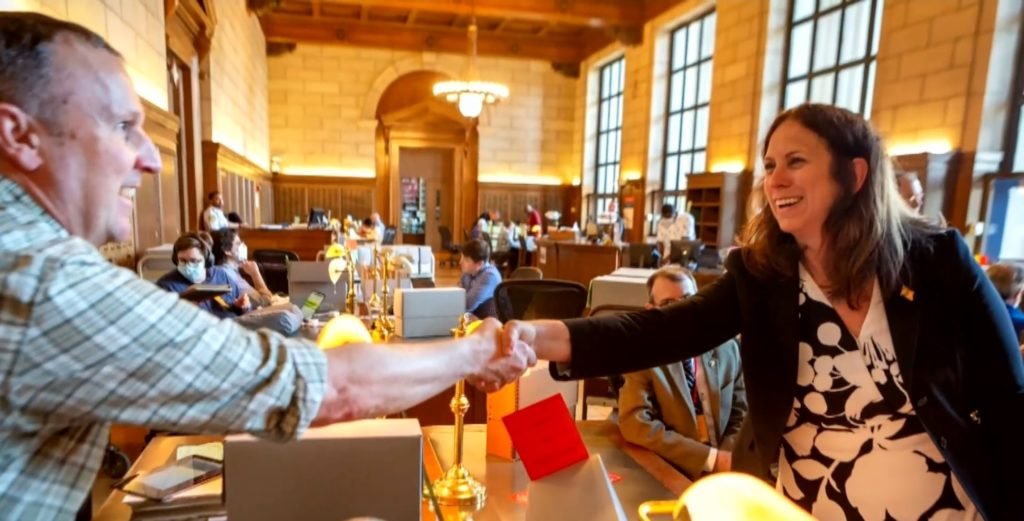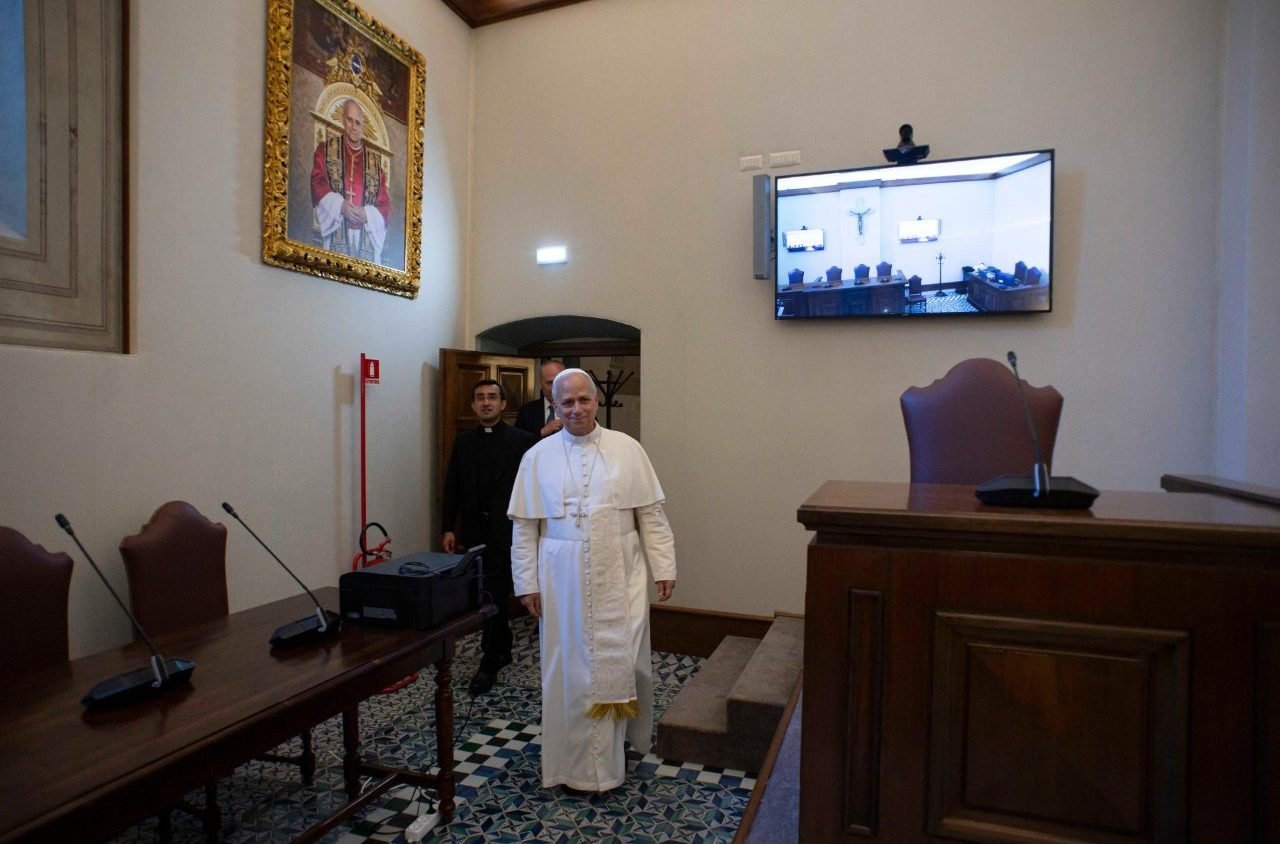Amna Nawaz:
Colleen Shogan made history when she became the first woman to serve as archivist of the United States in 2023, until February, when President Trump fired her with no warning or reason given.
Now Shogan has a new challenge, which she unveiled during our exclusive interview. Today, Constitution Day, she launched a national bipartisan effort, part of an alliance of 34 presidential centers and some 100 groups, called More Perfect, working to strengthen our democracy.
This report is part of our series Art in Action, exploring the intersection of art and democracy and part of our canvas arts coverage.
At Lincoln’s Cottage in Washington, D.C., Colleen Shogan knows history has its eyes on her. As the nation prepares to mark 250 years, she’s working to steer it back on track with what she calls a civics education moonshot.
What is the problem that U.C. needs fixing right now?
Colleen Shogan, Former Archivist of the United States: I think we have a crisis with civics education in this country. We know some of the statistics are alarming.
About 22 percent of our nation’s eighth graders are proficient in civics education. We also know that 70 percent of Americans, adults, would be unable to answer the basic questions on a civics or history test.
Amna Nawaz:
When you say that many Americans can’t answer basic questions, what kind of questions are we talking about?
Colleen Shogan:
Something like how many branches of government are in the United States or which branch of government is responsible for writing the laws, questions like that.
Amna Nawaz:
Shogan, who’s helped to lead nonpartisan groups from the Library of Congress, to the White House Historical Association, to the Women’s Suffrage Centennial Commission, is now spearheading a new national project to help fill that civics void.
Called In Pursuit, it calls upon former presidents and first ladies like the Clintons, Bushes, and Obamas, historians and thought leaders, including multiple Pulitzer Prize winners, and journalists, including our own Judy Woodruff, each contributing an essay about a president or first lady, an idea born from Shogan’s time leading the National Archives.
Colleen Shogan:
I visited all of the presidential libraries when I was the archivist of the United States, and what I witnessed was that people can access American history through our presidents, through our first families. It’s familiar to them and it’s an easy way in which we can tell lessons about American history through that lens.
I used to walk into the Rotunda on a daily basis where the founding documents are on display, and I got to talk to people from all across the United States. No matter what their political affiliation or where they came from geographically in the United States, they’re proud of our history and they understand that it is a mixture of good things that have happened, difficult challenges that have happened, and they want to learn about it.
Amna Nawaz:
The project’s tagline says it plainly: “We call our nation the great American experiment. It’s time to act like it.”
Is it a call to action?
Colleen Shogan:
It’s a call to think about our history and learn the lessons from it, so we can inform our present and our future. I mean, history is not a static enterprise. History isn’t just frozen in time. We should view history as a continuum. We should be able to look backwards. And, as the National Archives on the building says, the past is prologue.
Amna Nawaz:
We’re at a time when there are real debates over which parts of our history we remember, how we remember them, what’s actually taught in our school system when it comes to American history. How do you view this effort in light of where we are?
Colleen Shogan:
I think we have to be accurate in our telling of American history. When we’re talking about the American story and should we talk about our failures, as well as our successes, how do you tell the story of American history accurately if you don’t tell both?
For example, how do you the story of a success like an Abraham Lincoln? I think most Americans would view Abraham Lincoln, his leadership with a degree of admiration, but how do we really account for that success in Lincoln’s leadership if we don’t understand the failures that preceded him in order to solve the crisis of slavery in this country?
You have to understand both. So that we can appreciate the times when we got it right, we have to understand when we got it wrong.
Amna Nawaz:
That brings us to this moment we’re seeing play out in real time when it comes to this administration and the pressure that’s been applied on our Smithsonian system of museums. We know the president says he wants to review the exhibits. That’s a moment of real tension we haven’t seen before. How do you look at that?
Colleen Shogan:
All of these institutions are charged with preserving our nation’s history and sharing our nation’s history with all Americans.
And the only way that these institutions can continue to be successful in their mission is if they remain independent.
Amna Nawaz:
You’re speaking from some level of experience here?
Colleen Shogan:
Yes, I am.
(Laughter)
Amna Nawaz:
You know what it is to be caught in that political crossfire. You had served as the national archivist since May of 2023 after the Senate confirmed you, and then you were fired by President Trump in February of this year. Were you surprised by that move? Did it catch you off guard?
Colleen Shogan:
It did catch me off guard. I think that anyone who has ever been in a situation similar to mine, in which you were doing your job and doing what you thought was a good job, and you were following in my case the law, and then to be dismissed in that way without any explanation or cause given, I think that you would have a degree of surprise, disappointment, and certainly at times anger.
Amna Nawaz:
To this day, you haven’t been given a reason for why you were dismissed; is that correct?
Colleen Shogan:
That’s correct.
Amna Nawaz:
There was some understanding that, because the president had been upset, and publicly, vocally upset, with the National Archives while the Justice Department was looking into his mishandling of classified documents at Mar-a-Lago, that it was related to that. We should point out you were not even in charge of the National Archives when that was going on.
But do you believe that may be why you were fired?
Colleen Shogan:
That would be something you would have to ask the president and the White House, because they have not shared any reason with me.
Amna Nawaz:
Shogan learned she’d been fired from a post on X. President Trump tapped Secretary of State and acting National Security Adviser Marco Rubio to step in as acting archivist.
Colleen Shogan:
The laws that govern our records in the United States, that created the National Archives, they were all written under the premise or the guise that the person running the National Archives would be selected because of his or her qualifications, not with regard to partisanship or politics.
Amna Nawaz:
When you look at what’s at stake at the institution you used to lead, the president’s 2026 budget includes deep cuts, nearly $60 million less than the projected 2025 spending levels, over $90 million less than was spent in 2024. What’s the impact of that going to be?
Colleen Shogan:
I think it’s going to be challenging for the National Archives. When I was the archivist of the United States, I spent a lot of time trying to do the reverse, which was to grow the budget of the National Archives in a responsible way.
The National Archives is going to see a deluge of born digital or born electronic records starting in the next five to 10 years. And, right now, the National Archives does not have the infrastructure to process those records or share those records with the American people. That system needs to be built.
Otherwise, there is going to be a situation in which, in the future, Americans will not have access to those records.
Amna Nawaz:
Would you say that there is no cuts that need to be made at the Archives? Is that your argument?
Colleen Shogan:
There are no cuts that need to be made at the National — in my experience, and I worked there and I led the institution.
Amna Nawaz:
In Pursuit hopes to reach 10 million Americans, including five million students. Shogan, who’s previously penned novels about murder and mayhem, is now working on another book, this one about public service.
Colleen Shogan:
I’m doing what I really love doing, which is sharing our nation’s history with as many Americans as possible, talking about the importance of civics education.
And what I just figured out was that I can do that no matter what role I had. So I’m very excited about this next opportunity and phase.




